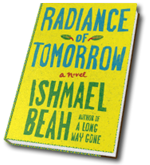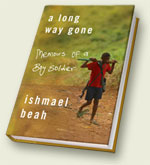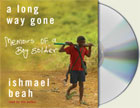![]() A Long Way Gone is a clear-eyed, undeniably compelling look at wartime violence.
A Long Way Gone is a clear-eyed, undeniably compelling look at wartime violence.![]()
— Entertainment Weekly
![]()
![]() Beah speaks in a distinctive voice, and he tells an important story.
Beah speaks in a distinctive voice, and he tells an important story.![]()
— The Wall Street Journal
![]()
![]() What Beah saw and did during [the war] has haunted him ever since, and if you read his stunning and unflinching memoir, you'll be haunted, too . . . It would have been enough if Ishmael Beah had merely survived the horrors described in A Long Way Gone. That he has written this unforgettable firsthand account of his odyssey is harder still to grasp. Those seeking to understand the human consequences of war, its brutal and brutalizing costs, would be wise to reflect on Ishmael Beah's story.
What Beah saw and did during [the war] has haunted him ever since, and if you read his stunning and unflinching memoir, you'll be haunted, too . . . It would have been enough if Ishmael Beah had merely survived the horrors described in A Long Way Gone. That he has written this unforgettable firsthand account of his odyssey is harder still to grasp. Those seeking to understand the human consequences of war, its brutal and brutalizing costs, would be wise to reflect on Ishmael Beah's story.![]()
— Philadelphia Enquirer
![]()
![]() When Beah is finally approached about the possibility of serving as a spokesperson on the issue of child soldiers, he knows exactly what he wants to tell the world: “I would always tell people that I believe children have the resilience to outlive their sufferings, if given a chance.” “Others may make the same assertions, but Beah has the advantage of stating them in the first person. That makes A Long Way Gone all the more gripping.
When Beah is finally approached about the possibility of serving as a spokesperson on the issue of child soldiers, he knows exactly what he wants to tell the world: “I would always tell people that I believe children have the resilience to outlive their sufferings, if given a chance.” “Others may make the same assertions, but Beah has the advantage of stating them in the first person. That makes A Long Way Gone all the more gripping.![]()
— Christian Science Monitor
![]()
![]() His honesty is exacting, and a testament to the ability of children “to outlive their sufferings, if given a chance.
His honesty is exacting, and a testament to the ability of children “to outlive their sufferings, if given a chance.![]()
— The New Yorker
![]()
![]() Deeply moving, even uplifting ... Beah's story, with its clear-eyed reporting and literate particularity—whether he's dancing to rap, eating a coconut or running toward the burning village where his family is trapped—demands to be read.
Deeply moving, even uplifting ... Beah's story, with its clear-eyed reporting and literate particularity—whether he's dancing to rap, eating a coconut or running toward the burning village where his family is trapped—demands to be read.![]()
— People, (Critic's Choice, Four stars)
![]()
![]() In place of a text that has every right to be a diatribe against Sierra Leone, globalization or even himself, Beah has produced a book of such self-effacing humanity that refugees, political fronts and even death squads resolve themselves back into the faces of mothers, fathers and siblings. "A Long Way Gone" transports us into the lives of thousands of children whose lives have been altered by war, and it does so with a genuine and disarmingly emotional force.
In place of a text that has every right to be a diatribe against Sierra Leone, globalization or even himself, Beah has produced a book of such self-effacing humanity that refugees, political fronts and even death squads resolve themselves back into the faces of mothers, fathers and siblings. "A Long Way Gone" transports us into the lives of thousands of children whose lives have been altered by war, and it does so with a genuine and disarmingly emotional force.![]()
— Minneapolis Star Tribune
![]()
![]() Beah is a gifted writer. . . Read his memoir and you will be haunted . . . It’s a high price to pay, but it’s worth it.
Beah is a gifted writer. . . Read his memoir and you will be haunted . . . It’s a high price to pay, but it’s worth it.![]()
— Newsweek.com
![]()
![]() A breathtaking and unselfpitying account of how a gentle spirit survives a childhood from which all innocence has suddenly been sucked out. It's a truly riveting memoir.
A breathtaking and unselfpitying account of how a gentle spirit survives a childhood from which all innocence has suddenly been sucked out. It's a truly riveting memoir.![]()
— Time Magazine
![]()
![]() Extraordinary . . . A ferocious and desolate account of how ordinary children were turned into professional killers.
Extraordinary . . . A ferocious and desolate account of how ordinary children were turned into professional killers.![]()
— The Guardian UK
![]()
![]() Hideously effective in conveying the essential horror of his experiences.
Hideously effective in conveying the essential horror of his experiences.![]()
— Kirkus Reviews
![]()
![]() A Long Way Gone hits you hard in the gut with Sierra Leone’s unimaginable brutality and then it touches your soul with unexpected acts of kindness. Ishmael Beah’s story tears your heart to pieces and then forces you to put it back together again, because if Beah can emerge from such horror with his humanity in tact, it’s the least you can do.
A Long Way Gone hits you hard in the gut with Sierra Leone’s unimaginable brutality and then it touches your soul with unexpected acts of kindness. Ishmael Beah’s story tears your heart to pieces and then forces you to put it back together again, because if Beah can emerge from such horror with his humanity in tact, it’s the least you can do.![]()
— Jeannette Walls, author of The Glass Castle: A Memoir
![]()
![]() This is a wrenching, beautiful, and mesmerizing tale. Beah's amazing saga provides a haunting lesson about how gentle folks can be capable of great brutalities as well goodness and courage. It will leave you breathless.
This is a wrenching, beautiful, and mesmerizing tale. Beah's amazing saga provides a haunting lesson about how gentle folks can be capable of great brutalities as well goodness and courage. It will leave you breathless.![]()
— Walter Isaacson, author of Benjamin Franklin: An American Life
![]()
![]() This is a beautifully written book about a shocking war and the children who were forced to fight it. Ishmael Beah describes the unthinkable in calm, unforgettable language; his memoir is an important testament to the children elsewhere who continue to be conscripted into armies and militias.
This is a beautifully written book about a shocking war and the children who were forced to fight it. Ishmael Beah describes the unthinkable in calm, unforgettable language; his memoir is an important testament to the children elsewhere who continue to be conscripted into armies and militias.![]()
— Steve Coll, author of Ghost Wars: The Secret History of the CIA, Afghanistan, and Bin Laden, from the Soviet Invasion to September 10, 2001, winner of the 2005 Pulitzer Prize for General Nonfiction
![]()
![]() A Long Way Gone is one of the most important war stories of our generation. The arming of children is among the greatest evils of the modern world, and yet we know so little about it because the children themselves are swallowed up by the very wars they are forced to wage. Ishmael Beah has not only emerged intact from this chaos, he has become one of its most eloquent chroniclers. We ignore his message at our peril.
A Long Way Gone is one of the most important war stories of our generation. The arming of children is among the greatest evils of the modern world, and yet we know so little about it because the children themselves are swallowed up by the very wars they are forced to wage. Ishmael Beah has not only emerged intact from this chaos, he has become one of its most eloquent chroniclers. We ignore his message at our peril.![]()
— Sebastian Junger, author of A Death in Belmont and The Perfect Storm
![]()
![]() How is it possible that 26-year-old Beah, a nonnative English speaker, separated from his family at age 12, taught to maim and to kill at 13, can sound such notes of family happiness, of friendship under duress, of quiet horror? No outsider could have written this book, and it’s hard to imagine that many insiders could do so with such acute vision, stark language, and tenderness. It is a heart-rending achievement.
How is it possible that 26-year-old Beah, a nonnative English speaker, separated from his family at age 12, taught to maim and to kill at 13, can sound such notes of family happiness, of friendship under duress, of quiet horror? No outsider could have written this book, and it’s hard to imagine that many insiders could do so with such acute vision, stark language, and tenderness. It is a heart-rending achievement.![]()
— Melissa Fay Greene, Elle
![]()
![]() Told in clear, accessible language by a young writer with a gifted literary voice, this memoir seems destined to become a classic firsthand account of war and the ongoing plight of child soldiers in conflicts worldwide.
Told in clear, accessible language by a young writer with a gifted literary voice, this memoir seems destined to become a classic firsthand account of war and the ongoing plight of child soldiers in conflicts worldwide.![]()
— Publishers Weekly (Starred Review)
![]()

Sarah Crichton Books
Farrar, Straus and Giroux
January 7, 2014
Fiction
Hardcover; $25.00
ISBN 13: 978-0-374-24602-0
ISBN 10: 0-374-24602-5


